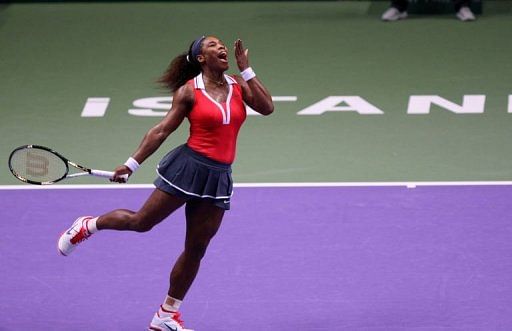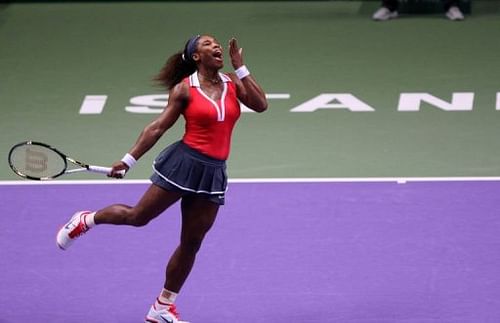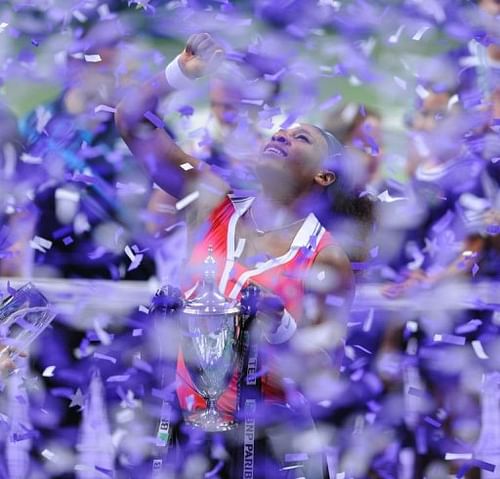
Serena crowns year with WTA Championships title
Serena Williams reacts during her match with Maria Sharapova” href=”https://staticg.sportskeeda.com/wp-content/uploads/2012/10/photo_1351443165483-4-0.jpg" class="sk-app-thumbnail” rel=”prettyPhoto[] nofollow” target=”_blank”>

Serena Williams of the US reacts during her match with Maria Sharapova of Russia at the final match of WTA Championships tennis tournament in Istanbul. Serena won 6-4, 6-3.
ISTANBUL - Serena Williams completed her sensational 2012 comeback by easing to a 6-4, 6-3 win over Maria Sharapova for a third WTA Championships title on Sunday.
The 31-year-old’s victory came at the end of a spectacular year in which she also collected the Wimbledon, Olympic and US Open titles.
“It feels great to have achieved my dream,” said Williams, whose career head-to-head record over Sharapova now stands at 10-2.
“Maria won the last time we played in the Championships final, but she’s ranked ahead of me so I had nothing to lose.”

Serena Williams of the United States holds the trophy after winning the final of the WTA Championships tennis tournament against Maria Sharapova of Russia in Istanbul.
Williams, who has battled back to the top of her game after battling injury and a life-threatening illness, said 2012 was just as good as 2002 and 2003 when she completed the “Serena Slam” of all four Grand Slams.
“It’s awesome. To come back after being in the hospital, I feel so happy whether I win or lose,” said the American veteran.
The third seed’s weight of shot, reliability of serve, and undiminished motivation enabled her to apply constant pressure.
As early as the fifth game, when she broke Sharapova’s serve for the first time, she looked the likely winner.
Williams also saved her best performance of the week for Sharapova and history may have played a part in that.
Since the year in which a 17-year-old Sharapova shocked Serena in the 2004 Wimbledon final, the Russian has not been able to repeat the win in eight attempts. After breaking for 3-2, consolidating for 4-2, and holding on to that advantage to close out the first set, she was relentless.
At least it did not take Sharapova long to do better than last time when she managed just one game in the Olympics final.
She looked keen to atone for that, so there was an edge to the encounter, over and above that of a big final.
Sharapova also tried hard to force the issue with her ground strokes, taking risks in the process.
She clung to her service games to reach 3-4 despite two break points against her in that game, varied her angles well, and covered the court better than she ever did, but the rewards were modest.
That was partly because the biggest difference between them was not just the number of clean winners that Serena could make with her heavier hitting. A more significant difference was in their serving.
Not that Sharapova struggled with double faults, occasionally a blight in recent years.
Instead it was that her second delivery was more attackable than Williams’s. And Williams missed few chances to reveal that.
Crucially, she did so in the opening game of the second set, and having gained an early break which felt like a statement, never looked likely to relinquish it.
Sharapova fought with typical courage, but in the final game she found that her first delivery, as well as her second, was coming in for some ferocious treatment, and she dropped serve for a third time.
Williams rounded it all off with a rocketing forehand return from a respectable first serve, that brought a jet engine roar from 15,000 throats.
She celebrated with delighted hops and a raised arm, which indicated that, even after all these years, it meant as much to her as ever.
Or perhaps more since it crowned an amazing comeback year after life-threatening blood clots on her lungs.
“I think she can still improve, even at 31,” said her coach Patrick Mouratoglou. “She’s playing really, really well. Her results speak for themselves. She can improve in many areas, and she’s willing to improve.
“The other girls are improving, so to win more Grand Slams she has to do that.”
It was also re-defining year for Sharapova, the French Open winner, after a shoulder injury four years ago threatened to put the leading group permanently beyond her reach.